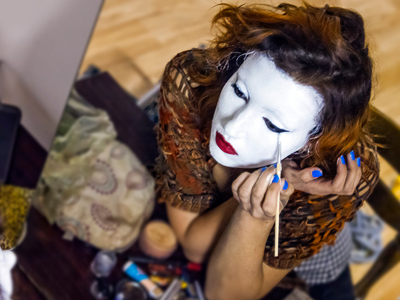
Ask the AI Tutor
Need help with Literary Terms 01? Ask our AI Tutor!
AI Tutor - Lucy
Connecting with Tutor...
Please wait while we establish connection

What is the main character in a story or play known as?
Literary Terms 01
Master key literary terms for GCSE English. Learn how devices like imagery, juxtaposition and irony shape meaning, then practise spotting them in poems, plays and non fiction.
1 .
Choose the correct literary term.
The main character in a story or play.
The main character in a story or play.
Antagonist
Protagonist
Peripheral character
Sidekick
An antagonist would be an adversary of the main character
2 .
Choose the correct literary term.
Saying one thing, while meaning something else.
Saying one thing, while meaning something else.
Satire
Irony
Tragedy
Comedy
'Dramatic irony' is when the reader knows something that the characters don't know
3 .
Choose the correct literary term.
An individual represented dramatically or in narrative.
An individual represented dramatically or in narrative.
Idiom
Figure
Author
Character
4 .
Choose the correct literary term.
The sensory perceptions created by a word or phrase.
The sensory perceptions created by a word or phrase.
Poetry
Description
Imagery
Ballad
5 .
Choose the correct literary term.
The personal angle or perspective from which a story is told.
The personal angle or perspective from which a story is told.
Distance
Omniscience
Point of view
Autobiographical
6 .
Choose the correct literary term.
The central idea of a work of literature.
The central idea of a work of literature.
Subject
Mood
Theme
Event
7 .
Choose the correct literary term.
In a narrative or dramatic work, the events which occur and their relationship to one another.
In a narrative or dramatic work, the events which occur and their relationship to one another.
Plot
Mood
Structure
Narration
A plot is the collection of all the events in a work of fiction, especially the way these events are related to one another. While plots must have structure, 'structure' alone is not the same as the plot
8 .
Choose the correct literary term.
The 'person' who tells the story to the audience in a work of fiction.
The 'person' who tells the story to the audience in a work of fiction.
Antagonist
Protagonist
Author
Narrator
Be careful - the author and the narrator are not the same, although sometimes the narrator resembles the author. All stories have a narrator
9 .
Choose the correct literary term.
A description of words or situations which can have more than one possible meaning.
A description of words or situations which can have more than one possible meaning.
Ambiguous
Paradoxical
Definitive
Simile
A word or situation is ambiguous when it has several possible meanings and it is unclear which meaning the author intends
10 .
Choose the correct literary term.
A conversation between characters in a narrative or dramatic work.
A conversation between characters in a narrative or dramatic work.
Dialogue
Monologue
Narration
Argument
**Unlimited Quizzes Await You! 🚀**
Hey there, quiz champ! 🌟 You've already tackled today's free questions.
Ready for more?
Ready for more?
🔓 Unlock UNLIMITED Quizzes and challenge yourself every day. But that's
not all...
not all...
🔥 As a Subscriber you can join our thrilling "Daily Streak" against other
quizzers. Try to win a coveted spot on our Hall of Fame Page.
quizzers. Try to win a coveted spot on our Hall of Fame Page.
Don't miss out! Join us now and keep the fun rolling. 🎉
**Unlimited Quizzes Await You! 🚀**
Hey there, quiz champ! 🌟 You've already tackled today's free questions. Ready for more?
🔓 Unlock UNLIMITED Quizzes and challenge yourself every day. But that's not all...
🔥 As a Subscriber you can join our thrilling "Daily Streak" against other quizzers. Try to win a coveted spot on our Hall of Fame Page.
Don't miss out! Join us now and keep the fun rolling. 🎉






